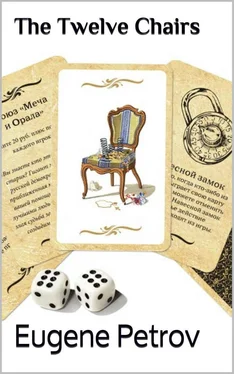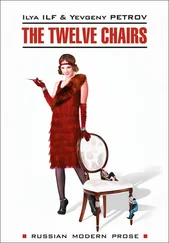Eugene Petrov - The Twelve Chairs
Здесь есть возможность читать онлайн «Eugene Petrov - The Twelve Chairs» весь текст электронной книги совершенно бесплатно (целиком полную версию без сокращений). В некоторых случаях можно слушать аудио, скачать через торрент в формате fb2 и присутствует краткое содержание. Год выпуска: 2013, Жанр: Юмористическая проза, на английском языке. Описание произведения, (предисловие) а так же отзывы посетителей доступны на портале библиотеки ЛибКат.
- Название:The Twelve Chairs
- Автор:
- Жанр:
- Год:2013
- ISBN:нет данных
- Рейтинг книги:5 / 5. Голосов: 1
-
Избранное:Добавить в избранное
- Отзывы:
-
Ваша оценка:
- 100
- 1
- 2
- 3
- 4
- 5
The Twelve Chairs: краткое содержание, описание и аннотация
Предлагаем к чтению аннотацию, описание, краткое содержание или предисловие (зависит от того, что написал сам автор книги «The Twelve Chairs»). Если вы не нашли необходимую информацию о книге — напишите в комментариях, мы постараемся отыскать её.
Find traces of a separate headset difficult and heroes face different adventures and troubles.
The Twelve Chairs — читать онлайн бесплатно полную книгу (весь текст) целиком
Ниже представлен текст книги, разбитый по страницам. Система сохранения места последней прочитанной страницы, позволяет с удобством читать онлайн бесплатно книгу «The Twelve Chairs», без необходимости каждый раз заново искать на чём Вы остановились. Поставьте закладку, и сможете в любой момент перейти на страницу, на которой закончили чтение.
Интервал:
Закладка:
turned to go. But the priest had now recovered from his embarrassment and
was not going to yield Vorobyaninov such an easy victory. With a cry of "No,
I'm sorry," he grasped hold of the chair again. Their initial position was
restored. The two opponents stood clutching the chair and, moving from side
to side, sized one another up like cats or boxers. The tense pause lasted a
whole minute.
"So you're after my property, Holy Father?" said Ippolit Matveyevich
through clenched teeth and kicked the holy father in the hip.
Father Theodore feinted and viciously kicked the marshal in the groin,
making him double up.
"It's not your property."
"Whose then?"
"Not yours!"
"Whose then?"
"Not yours!"
"Whose then? Whose?"
Spitting at each other in this way, they kept kicking furiously.
"Whose property is it then?" screeched the marshal, sinking his foot in
the holy father's stomach.
"It's nationalized property," said the holy father firmly, overcoming
his pain.
"Nationalized? "
"Yes, nationalized."
They were jerking out the words so quickly that they ran together.
" Who-nationalized-it? "
"The-Soviet-Government. The-Soviet-Government."
"Which-government? "
"The-working-people's-government."
"Aha!" said Ippolit Matveyevich icily. "The government of workers and
peasants?"
"Yes!"
"Hmm . . . then maybe you're a member of the Communist Party, Holy
Father?"
"Maybe I am!"
Ippolit Matveyevich could no longer restrain himself and with a shriek
of "Maybe you are" spat juicily in Father Theodore's kindly face. Father
Theodore immediately spat in Ippolit Matveyevich's face and also found his
mark. They had nothing with which to wipe away the spittle since they were
still holding the chair. Ippolit Matveyevich made a noise like a door
opening and thrust the chair at his enemy with all his might. The enemy fell
over, dragging the panting Vorobyaninov with him. The struggle continued in
the stalls.
Suddenly there was a crack and both front legs broke on simultaneous'y.
The opponents completely forgot one another and began tearing the walnut
treasure-chest to pieces. The flowered English chintz split with the
heart-rending scream of a seagull. The back was torn off by a mighty tug.
The treasure hunters ripped off the sacking together with the brass tacks
and, grazing their hands on the springs, buried their fingers in the woollen
stuffing. The disturbed springs hummed. Five minutes later the chair had
been picked clean. Bits and pieces were all that was left. Springs rolled in
all directions, and the wind blew the rotten padding all over the clearing.
The curved legs lay in a hole. There were no jewels.
"Well, have you found anything?" asked Ippolit Matveyevich, panting.
Father Theodore, covered in tufts of wool, puffed and said nothing.
"You crook!" shouted Ippolit Matveyevich. "I'll break your neck, Father
Theodore!"
"I'd like to see you! " retorted the priest. "Where are you going all
covered in fluff? " "Mind your own business!"
"Shame on you, Father! You're nothing but a thief!" "I've stolen
nothing from you."
"How did you find out about this? You exploited the sacrament of
confession for your own ends. Very nice! Very fine!"
With an indignant "Fooh! " Ippolit Matveyevich left the clearing and,
brushing his sleeve as he went, made for home. At the corner of Lena
Massacre and Yerogeyev streets he caught sight of his partner. The technical
adviser and director-general of the concession was having the suede uppers
of his boots cleaned with canary polish; he was standing half-turned with
one foot slightly raised. Ippolit Matveyevich hurried up to him. The
director was gaily crooning the shimmy:
"The camels used to do it,
The barracudas used to dance it,
Now the whole world's doing the shimmy."
"Well, how was the housing division?" he asked in a businesslike way,
and immediately added:
"Wait a moment. Don't tell me now; you're too excited. Cool down a
little."
Giving the shoeshiner seven kopeks, Ostap took Vorobyaninov by the arm
and led him down the street. He listened very carefully to everything the
agitated Ippolit Matveyevich told him.
"Aha! A small black beard? Right! A coat with a sheepskin collar? I
see. That's the chair from the pensioner's home. It was bought today for
three roubles."
"But wait a moment. . . ."
And Ippolit Matveyevich told the chief concessionaire all about Father
Theodore's low tricks.
Ostap's face clouded.
"Too bad," he said. "Just like a detective story. We have a mysterious
rival. We must steal a march on him. We can always break his head later."
As the friends were having a snack in the Stenka Razin beer-hall and
Ostap was asking questions about the past and present state of the housing
division, the day came to an end.
The golden carthorses became brown again. The diamond drops grew cold
in mid-air and plopped on to the ground. In the beer-halls and Phoenix
restaurant the price of beer went up. Evening had come; the street lights on
Greater Pushkin Street lit up and a detachment of Pioneers went by, stamping
their feet, on the way home from their first spring outing.
The tigers, figures of victory, and cobras on top of the
province-planning administration shone mysteriously in the light of the
advancing moon.
As he made his way home with Ostap, who was now suddenly silent,
Ippolit Matveyevich gazed at the tigers and cobras. In his time, the
building had housed the Provincial Government and the citizens had been
proud of their cobras, considering them one of the sights of Stargorod.
"I'll find them," thought Ippolit Matveyevich, looking at one of the
plaster figures of victory.
The tigers swished their tails lovingly, the cobras contracted with
delight, and Ippolit Matveyevich's heart filled with determination.
CHAPTER TEN
THE MECHANIC, THE PARROT, AND THE FORTUNE-TELLER
No. 7 Pereleshinsky Street was not one of Stargorod's best buildings.
Its two storeys were constructed in the style of the Second Empire and were
embellished with timeworn lion heads, singularly reminiscent of the once
well-known writer Artsybashec. There were exactly seven of these
Artsybashevian physiognomies, one for each of the windows facing on to the
street. The faces had been placed at the keystone of each window.
There were two other embellishments on the building, though these were
of a purely commercial nature. On one side hung the radiant sign:
ODESSA ROLL BAKERY
MOSCOW
BUN ARTEL
The sign depicted a young man wearing a tie and ankle-length French
trousers. Ift one dislocated hand he held the fabulous cornucopia, from
which poured an avalanche of ochre-coloured buns; whenever necessary, these
were passed off as Moscow rolls. The young man had a sexy smile on his face.
On the other side, the Fastpack packing office announced itself to
prospective clients by a black board with round gold lettering.
Despite the appreciable difference in the signs and also in the capital
possessed by the two dissimilar enterprises, they both engaged in the same
business, namely, speculation in all types of fabrics: coarse wool, fine
wool, cotton, and, whenever silk of good colour and design came their way,
silk as well.
Passing through the tunnel-like gateway and turning right into the yard
with its cement well, you could see two doorways without porches, giving
Читать дальшеИнтервал:
Закладка:
Похожие книги на «The Twelve Chairs»
Представляем Вашему вниманию похожие книги на «The Twelve Chairs» списком для выбора. Мы отобрали схожую по названию и смыслу литературу в надежде предоставить читателям больше вариантов отыскать новые, интересные, ещё непрочитанные произведения.
Обсуждение, отзывы о книге «The Twelve Chairs» и просто собственные мнения читателей. Оставьте ваши комментарии, напишите, что Вы думаете о произведении, его смысле или главных героях. Укажите что конкретно понравилось, а что нет, и почему Вы так считаете.












